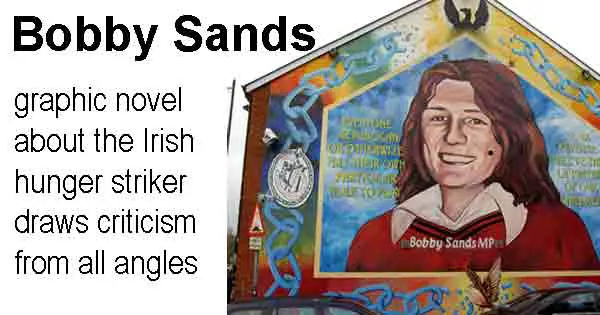A graphic novel that tells the story of Irish hunger striker Bobby Sands has caused controversy and received criticism from various groups.
Sands was a member of the Provisional IRA and also a Member of Parliament for Fermanagh and South Tyrone.
He dedicated his life to trying to reunite Northern Ireland with the Republic and died aged 27 after 66 days on hunger strike in a British prison.

A graphic novel – titled ‘Bobby Sands: Freedom Fighter’ – that tells the story of his life and death has been published by O’Brien Press in Dublin.
It was written and illustrated by 80-year-old Gerry Hunt and funded by the National Lottery through the Arts Council.
However, the novel was published without the consent of Sands’ family who say it exploits his memory.
The Sands family released a statement that said: “It is reprehensible that the family, including our elderly mother, was first made aware of this book when confronted by extracts displayed in the media.
“We are given to understand that the book contains intimate family scenes that no one, other than our family members, would be privy to. It is unfortunate that well-meaning people, such as Mr Hunt, are misled by those who profess to be authorities on Bobby’s life story.
“Our family once again reiterates that the Bobby Sands Trust does not act on behalf of Bobby, nor does it represent our family, in any shape or form. We again call upon the trust to disband and desist from using Bobby’s memory as a commercial enterprise.”
The Bobby Sands Trust is run by senior Sinn Féin members such as Gerry Adams. However, Sands’ family are not involved with the Trust and have called for it to be disbanded on numerous occasions.
The book has also received criticism from Unionists who say that Sands was not a ‘freedom fighter’ but a ‘terrorist’.
Former Ulster Unionist Party leader Tom Elliott told the Irish Times: “Because it is a comic book, it is directed at young people. It is wrong to be sending out a message that somehow terrorism is appropriate. That is just not right.
“He was not a freedom fighter. He was a terrorist who belonged to an organization that murdered fellow Irish citizens.
“How the Arts Council ever came to fund this project I have no idea. I will be putting in some questions about what were the criteria for funding to the department and to the council.”
Publisher Michael O’Brien responded by saying: “You could also call the men of 1916 terrorists. I would say when all peaceful protests have failed and there is grave injustice sometimes people are left with no alternative except violence.”
He added that the graphic novel was actually aimed at adults rather than children.
A Northern Arts spokesman said: “The Bobby Sands book, a full colour graphic novel by Gerry Hunt, is by an author and illustrator who has a significant track record in the genre of graphic novels and has written other historical graphic novels.
“We do not interfere with editorial content nor do we draw a line regarding content chosen by publishers which may attract controversy.”
Does the graphic novel disrespect Sands’ legacy?
It is an interesting debate. On the one hand it could be argued that a graphic novel could bring an important story to an audience that may not know much about it.
However, does such a format have the ability to tell Sands’ story with the sensitivity required to remain respectful to his legacy?
For an example of the content of the novel take a look at a few images of pages that were published in the Belfast Telegraph.
Let us know what you think in the comments below.
newsletter.html”]
